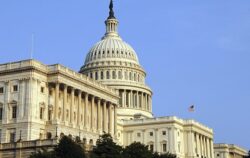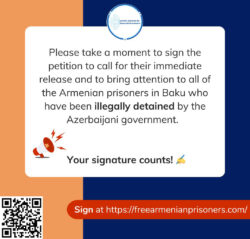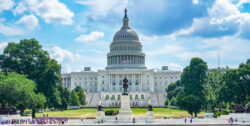“Biden Administration Must Wake Up”

WASHINGTON, D.C. – On Wednesday, September 6, 2023, the Congressional Tom Lantos Human Rights Commission conducted an emergency hearing to address the ongoing blockade of the Lachin Corridor in Nagorno-Karabakh (Artsakh). The hearing addressed the ongoing blockade of the Lachin Corridor in Nagorno-Karabakh, focusing on the deteriorating situation in Artsakh and the ongoing humanitarian crisis. Representative Christopher H. Smith (R-NJ), who serves as the Commission’s Co-Chair, proposed the idea of holding President Ilham Aliyev of Azerbaijan responsible for his genocidal intentions and underscored the necessity for enacting new legislation, such as the “Nagorno-Karabakh Human Rights Act.”
The hearing featured statements from two distinguished experts in the field: Luis Morena Ocampo, the former prosecutor of the International Criminal Court, and David L. Phillips, who holds the position of Adjunct Professor at Georgetown University and serves as the Director of Columbia University’s Program on Human Rights and Peace-building, along with leading the Atrocities Artsakh Project.
During his testimony, Ocampo warned the United States is at risk of becoming complicit in an ongoing genocide in Nagorno-Karabakh, where 120,000 ethnic Armenians have been sealed off from food and medicine and are being starved to death by the government of Azerbaijan. The grave warning from Luis Moreno Ocampo, the former Chief Prosecutor of the International Criminal Court (ICC), comes just weeks after he issued a dire report that the Azerbaijani blockade of the Lachin Corridor—the lone road from Armenia to Nagorno-Karabakh—constitutes genocide under Article II (c) of the Genocide Convention.
“The Biden Administration must say immediately that this is genocide—and put a stop to it,” said Rep. Smith, Co-Chair of the Tom Lantos Human Rights Commission, who noted that both the US State Department and USAID did not respond to his invitation to testify at the hearing. “Delay is denial.”
“This crime—it is the crime of genocide—was planned, tested, and imposed by the government of Azerbaijan, that is to say by President Ilham Aliyev, who rules Azerbaijan as a dictator,” said Smith, who met with Aliyev twice—in 2013 and again in 2014—to discuss his human rights abuses and later authored the Azerbaijan Democracy Act in 2015.
“The Biden Administration must wake up, recognize the absolutely grave responsibility it has here, and focus on finding and implementing a humane solution,” said Smith. “And this must mean that the blockade is lifted and the people continue to live in their ancient homeland—and not be subject to violence and threats. This situation is now a three-alarm fire.”
Smith, who chaired a hearing on the unfolding crisis two months ago in June, said “the situation in Nagorno-Karabakh is much more desperate now, and two-and-a-half more months of inaction raises the question whether there is, within our own government, any will to help. In August, when the Security Council met in special session to discuss the crisis, neither the US nor any other member took action to refer this matter to the International Criminal Court.”
“Meanwhile, the Azerbaijani government taunts the very people it is starving, as when President Aliyev said his blockade is necessary to deal with the smuggling of cigarettes and iPhones, and Azerbaijan’s ambassador to the UN held up photos of supposed Karabakh residents partying and enjoying the high life,” Smith added.
“Of course we know the Biden administration does not want this genocide to advance to a horrible consummation in the death of the people of Nagorno-Karabakh or to their ethnic cleansing, but that is exactly where events are headed,” said Smith.
“There are different forms to committing genocide,” said Ocampo. “The crime can be to create the conditions of genocide.” He noted that blocking the Lachin Corridor and not allowing essential goods to reach the Armenian people is “creating the conditions of genocide under Article 2(c) [of the Convention on the Prevention and Punishment of the Crime of Genocide].”
Ocampo said it was “easy” to come to a conclusion regarding genocide due to the ICC’s ruling in February 2023 that Azerbaijan must open the Lachin Corridor.
“Fifteen judges on the ICC in The Hague reviewed the issue after listening to Armenia and Azerbaijan representatives and they concluded that blocking the Lachin Corridor was creating an imminent risk for the life of Armenians living in Nagorno-Karabakh,” said Ocampo. “The material element of genocide was obviously there.”
Ocampo emphasized that the “urgency is to prevent the harm” and stop genocide. He expressed the importance of the special hearing because the “first step is to remove the denial.”
“This [hearing] could be a turning point on denial,” said Ocampo, who recommended to the Commission that information is sent to the Executive Branch to indicate the urgency of the matter.
He opined that the U.S. shouldn’t be involved in negotiations when “Aliyev uses genocide as a method of the negotiation,” because then the U.S. can be “considered complicit.”
“Stop the denial, recognize the [genocidal intent], and protect the lives of the 120,000 Armenians in Nagorno-Karabakh,” he concluded.
“The language used by President Aliyev and his officials leaves no question about their genocidal intent,” said Phillips, who provided extensive evidence as part of his testimony, including a list of perpetrators who are responsible for the atrocities in Nagorno-Karabakh.
“The international community failed to sanction individuals who committed crimes after the war in 2016 and 2020,” Phillips said. “Its failure sent a message to the Government of Azerbaijan that it can act with impunity and escape repercussions for its crimes against humanity, ethnic cleansing and acts of genocide.”
“The US should openly inform the Azerbaijan government that without the immediate and unconditional removal of the Lachin Corridor blockade, the US would consider Azerbaijan to be committing genocide,” Ocampo added.





